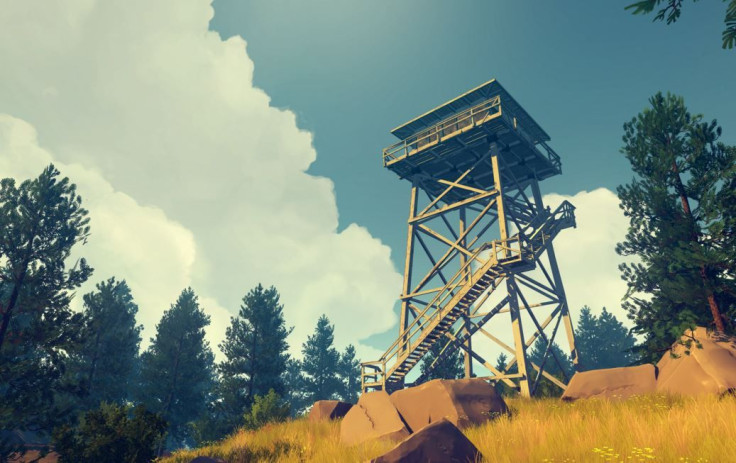This February has established itself as being the king of smaller games, and Firewatch may just be the best of the lot. Told over the course of one summer in 1988, Firewatch will make you feel every feeling you can.
Right from the start, Firewatch immediately assaults you with emotion. You get to build out a life for your character, Henry, thanks to a series of dialogue options. I don’t want to give away any story moments, but Firewatch packs as much emotion into these first few moments of dialogue as Up did in its opening vignette.
After you have built up the backstory for Henry, the game actually starts. In Firewatch, Henry basically runs away from all his responsibility and becomes a volunteer guard for the National Parks Service for three months, tasked with keeping an eye on a National Forest in Wyoming. Normally, this would mean simply sitting back and keeping an eye out for smoke.
Obviously, things don’t go as planned. Henry immediately is tasked with investigating a small fire by his supervisor, Delilah. Delilah is a sarcastic and foul-mouthed but charming woman put in charge of making sure all of the lookouts are alive and well.
While the small wild fire initially seems like nothing, issues start spreading like, well, you know. Again, there are so many great moments that I don’t want to ruin, but expect to feel every feeling there is while playing Firewatch.
What do I mean by that? I’ve already touched on how the opening is incredibly emotional, and definitely brought a tear to my eye. But there’s a whole range of emotions outside of sadness, and Firewatch does an amazing job of invoking them all. Expect to feel angry, confused, scared, paranoid, anxious, nervous, elated, betrayed and more.
The most interesting aspect of Firewatch is the relationship your Henry develops with Delilah. I mention “your Henry,” because the relationship can totally change depending on how you play. Talking to Delilah more will reveal more about her and about yourself. I actually found myself hunting out things to talk about, just to keep conversations going between the two characters.
This relationship wouldn’t be possible without the cast of Cissy Jones and Rich Sommer. Jones told iDigitalTimes that her and Sommer would record lines together, which is a rarity in the video game industry. This unique recording approach definitely helped make each conversation in Firewatch feel real and natural instead of a video game simply accessing different lines of dialogue to play back on cue.
I’ve spent so much time talking about the story, I haven’t mentioned anything about the gameplay yet. While there is a game in here, it’s all pretty much just following directions. Because the game is told over the course of one summer, you’ll have different things to do each day. These include gathering supplies for yourself, reporting any fires you see, exploring areas around your lookout tower, and other tasks given to you by Delilah. It’s a heavily scripted experience (in a great way), so don’t expect a large open world to explore or a sandbox of toys to mess around with.
The forest of Firewatch is just stunning. Using a light cel-shaded style, Firewatch features brilliant, popping colors alongside muted grays and blacks. While you are limited to where and when you can go explore, I wanted to keep hiking around the Shoshone Forest way past when the credits had finished rolling.
Speaking of the credits, there is also a great feature where players will pick up a single-use film camera. Players can take pictures of their time while playing Firewatch , and those photos will appear alongside the credits at the end.
Firewatch is available on PC, Mac, Linux, and PS4 tomorrow, Feb. 9.
So what do you think? Are you interested in playing through Firewatch? What other games did you find were incredibly emotional? Let us know your thoughts in the comments section below.














![[EG April 19] Best 'Stardew Valley' Mods That Will Change](https://d.player.one/en/full/226012/eg-april-19-best-stardew-valley-mods-that-will-change.png?w=380&h=275&f=955520b8313253ee3c39c791f6210f38)



